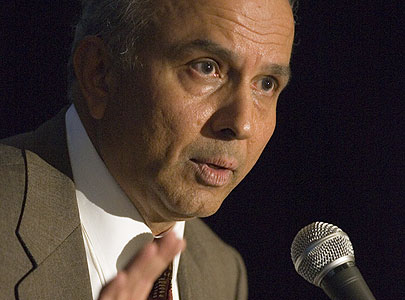

Warren Buffett’s annual letter to shareholders is one of those dates even the most hardened of market pros circle on their calendar.
The Berkshire Hathaway Annual Letter to Shareholders is contained within the company’s annual report and has been a candid look inside one of investing’s greatest minds since 1965, a year, by the way, that Berkshire returned 23.8%.
The 2012 letter was no different. “When the partnership I ran took control of Berkshire in 1965, I could never have dreamed that a year in which we had a gain of $24.1 billion would be subpar…” mused Buffett about the ninth time in 48 years he didn’t beat the S&P.
Fairfax Financial’s Prem Watsa has often been referred to as “Canada’s Warren Buffett” and it’s a moniker he comes by honestly, even if the ever-humble value investor would almost certainly shun the comparison.
________________
Now trending on Cantech Letter: “Why Critics Love to Hate Elon Musk”
_________________
Watsa’s Fairfax Financial, an insurance company with direct investments in other insurance companies and a portfolio of bonds and common stocks, has an average annual return of 17.9% over the past decade. By comparison, the S&P 500 has returned 1.4% per year over the same period. Fairfax was Canada’s most profitable corporation in 2008, and through moves that sometimes puzzled the general public, Watsa kept making money through the worst recession in a generation. Before the market collapse of 2008, Watsa used credit default swaps to bet against the US credit market. His $341 million bet returned more than $2 billion. Underscoring the Buffett comparison, Watsa even sits on the advisory board of the Ben Graham Centre for Value Investing at Western’s Ivey School of Business.
_______________
This story is brought to you by Serenic (TSXV:SER). Serenic’s cash position as of its most recently reported quarter was greater than its market cap as of March 12th, which was $2.61-million. The company has zero long-term debt. Click here for more info.
________________
On Friday, Fairfax released its annual report, and Watsa’s letter to shareholders contained within. Watsa said 2012 was a very good year for the company.
“In the 27 years since we began in 1985,” he said, “our compound annual growth in book value per share has been 23%, while our common stock price has compounded at 19% annually.”
Further on in the letter, Watsa addressed an investment he has piled into of late; BlackBerry. Watsa, who now owns more than 10% of the company in Fairfax, and another 10% through his Hamblin Watsa Investment Counsel, describes his interest in BlackBerry in terms that would be familiar to anyone with a dogeared copy of Ben Graham’s Intelligent Investor.
“Remember the tech boom, when companies with no sales were valued at tens of billions of dollars? In 2000, Northern Telecom accounted for 36.5% of the Toronto Stock Exchange index and was worth almost Cdn $400 billion; by 2009, it was bankrupt! Well, last year the opposite happened to Research in Motion (now known as BlackBerry). At its low of approximately $6 per share, it sold at 1/3 of book value per share and a little above cash per share (it has no debt). The stock price had declined 95% from its high!”
Watsa, who revealed his average on BlackBerry is about $17 after he loaded up in the $6-8 range, says the market noise surrounding BlackBerry’s troubles were a classic value investing signal.
“What is striking, even for a person like me who has seen many bull and bear markets, is that at $6 per share, all the Wall Street and Bay Street analysts were uniformly negative – just as they were uniformly positive only a few years ago at prices north of $100 per share, ” he said. “John Templeton’s advice to us: “Buy at the point of maximum pessimism”, still rings in our ears!!”
The Fairfax chairman, who has joined BlackBerry’s board, used the company’s stock turnover, which was three times its float in 2012, to illustrate how much trading goes on in the market these days.
“In this frenzied, hyper environment, activist investors and hedge funds have become dominant – all focused on short term gains,” he notes. “Managements are replaced, employees laid off, divisions sold and companies auctioned off so that these investors can make a quick gain. Many a good company can be destroyed by these actions. We continue to take the long view, always friendly and always supportive of management.”
_______________
_______________
Comment
Leave a Reply
You must be logged in to post a comment.






 Share
Share Tweet
Tweet Share
Share




Prem Rules
He thinks like me. Smart guy. 🙂
I want to think like him
notice how my prediction of Blackberry was correct? unless Blackberry prompt invite to present the next generation smartphone, they are done. sorry to say its true.
I would be saying the same thing if I had 700m in a company. he is trying to turn his 700M investment into 3B